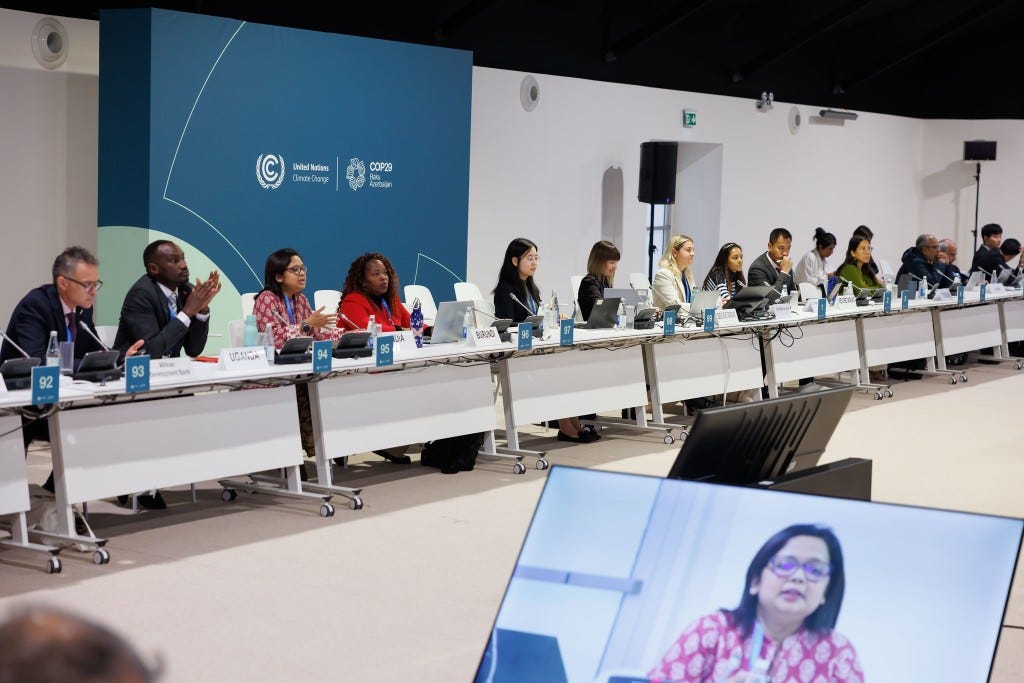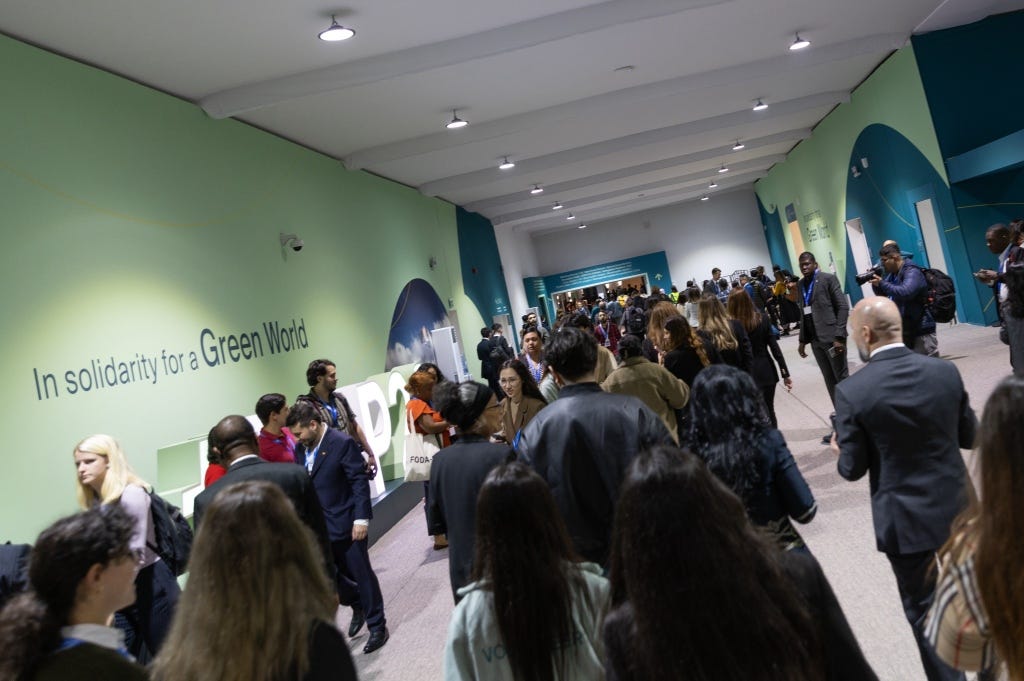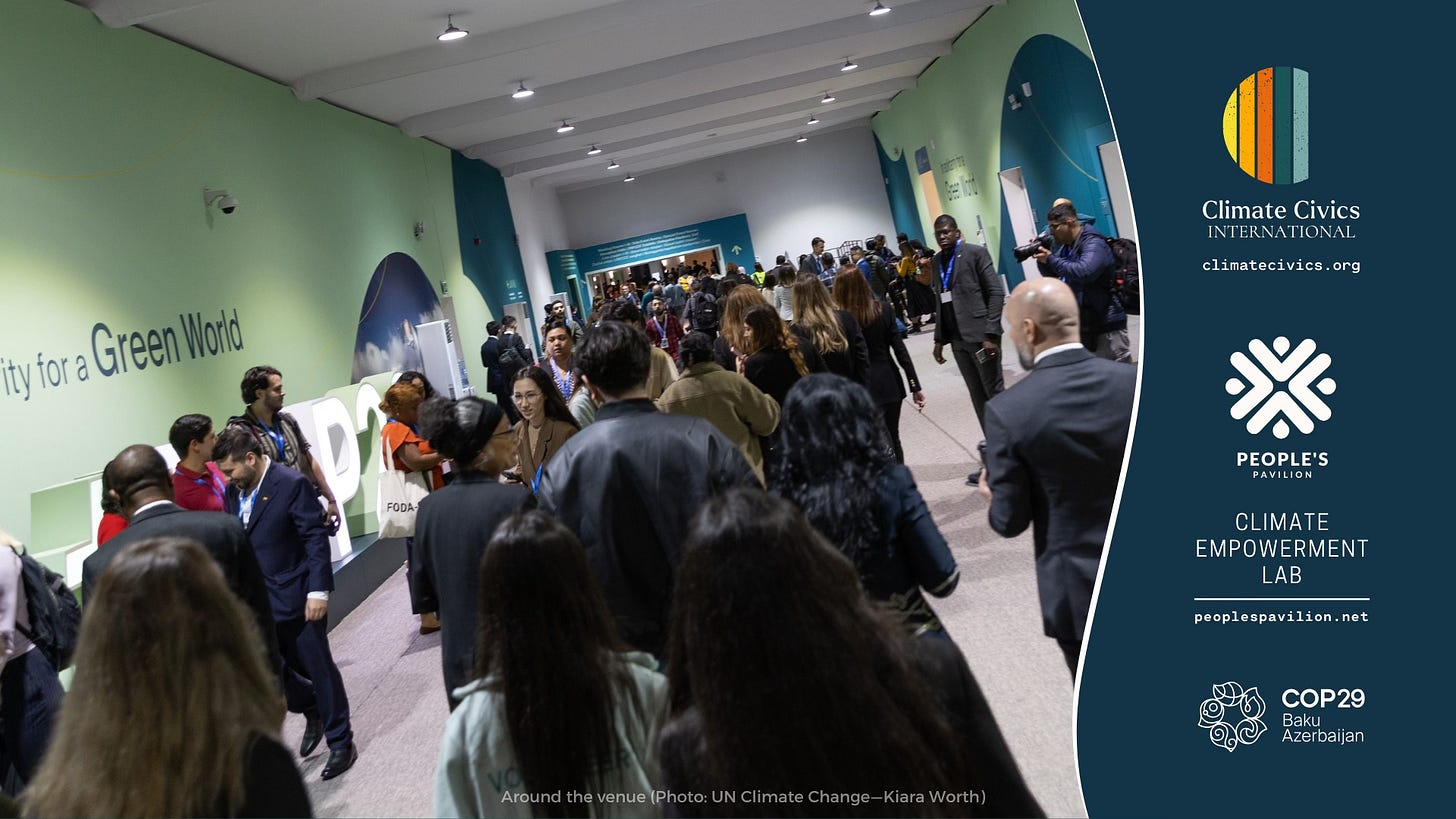COP29: Accelerate climate action to improve lives & livelihoods
CCI briefing note on six transformational areas of work the COP29 negotiations in Baku can advance
A safe, resilient, and livable climate future is possible. Shared prosperity, built around innovative industries that enhance climate value, should be a core feature of this better future. Several items on the agenda in Baku hold real potential to move us toward that safer and more livable world.
CCI is focusing on the following, due to their potentially transformational impact:
Civics, or the genius of local understanding
Finance reform, innovation, and instrumentation
Article 6.8 non-market cooperation and trade
The PARIS Principles and efforts toward a global floor price for pollution
Food systems that restore nature and improve health and livelihoods
Zero harm as the ambition-setting global goal
We must begin to grapple with new evidence that human activity has already warmed the planet by 1.5°C since 1700, before the coal-fired Industrial Revolution. These six areas of work can advance global climate action, improve conditions for people, and set nations on course for successful climate-resilient development, if we act now.
What do global climate talks have to do with civics?
Civics is the work of participating in decisions about the collective future of a society. Civics is the difference between a world where powerful institutions shape all outcomes and a world where our everyday lives shape and benefit from our collective efforts at problem-solving.
Drawing on the pre-COP29 Earth Diplomacy Leadership Report, robust ongoing civic engagement is a crucial piece of the overall project of enhancing transparency. We need to assess threats honestly and understand whether we have succeeded in operationalizing climate plans for everyday benefits across the economy.
Civics means taking abstract data, policy proposals, and negotiated outcomes, and translating them into everyday experience. It is a practical way of infusing humanity into big decisions that can shape the future of local communities. The more of this there is, the easier it is for everyone to be invested in the great global endeavor of preventing dangerous climate breakdown.
What do we mean when we say ‘finance’?
Key provisions of the Paris Agreement—Articles 2.1(c), 6.8, and 7.1—point to a new standard that might allow for mainstreaming climate finance that reduces debt burdens and makes capital more available for climate-resilient investments at large and small scales, including for frontline communities in vulnerable countries. We won’t seek to redefine finance on our own; this needs to be an inclusive process, but we can share some core principles:
Climate-related financial arrangements should not impose debt burdens that degrade capacity and opportunity on countries with low emissions and high vulnerability.
Grant-based capital sharing should facilitate broad-based de-risking, and the mobilization of multisector finance for risk reduction and resilience-building.
Investments in technical innovation—whether for mitigation or adaptation—should be designed to generate co-benefits, so investors are rewarded for creating value beyond their balance sheet.
Micro, small, and medium-sized enterprises that provide intermediary climate and data services, highlighting and enabling co-benefits, should be incubated, to allow the climate value economy to put down roots. (An example might be digital extension services for climate-smart agriculture.)
Innovative instruments, including co-benefit adjusted insurance, vulnerability-adjusted debt and grant financing, and multistakeholder resilience bonds, should be utilized.
The future of climate finance will be brightest and most value-building where the most benefit is generated for the widest population and most diverse range of non-financial interests. Negotiators at the COP29 should have this in mind when debating and designing the New Collective Quantified Goal (NCQG) and the various implementation mechanisms that will likely be needed to make it real.
Can ‘non-market’ cooperation transform trade?
Trade is just another way of talking about how two or more countries share the products of their mainstream economies. Trade can raise wages in one country while lowering prices (effectively increasing incomes) in another. Trade can be an exchange not only of goods but of ideas, technologies, capabilities, and visions of the future.
Trade can also lead to one country giving up certain types of jobs as capital chases lower costs elsewhere. We should not have to choose between trade that improves wellbeing for some and the status quo that allows others to have steady jobs. Opportunity needs to be more open to more people, and climate cooperation can make that possible.

Article 6.8 invites that kind of cooperative improvement of trade dynamics and outcomes, by calling for “poverty eradication and sustainable development” and enhanced capability and performance by both the public and private sectors. It suggests progress in areas not explicitly listed, such as agroecology and other practices that can enhance rural livelihoods and diversify struggling local economies, while improving human health and the health of nature.
To make this discussion more concrete, negotiators should consider the full spectrum of cooperative arrangements and initiatives that align with or help to achieve the goals of Article 6.8 of the Paris Agreement.
How can pollution pricing work if prices are already too high?
The 2023 State of the Climate report contained this haunting warning:
“By the end of this century, an estimated 3 to 6 billion individuals — approximately one-third to one-half of the global population — might find themselves confined beyond the livable region, encountering severe heat, limited food availability, and elevated mortality rates because of the effects of climate change (Lenton et al. 2023).”
Estimates of the costs of unchecked climate change from now to 2070 range from $178 trillion to $700 trillion; no nation can afford to let climate-disrupting fuels be the engine of mainstream economic activity for decades to come. The fiscal stability outlook is becoming bleak. This dynamic of adding massive hidden cost, all day every day, has to change.
The PARIS Principles call for pollution prices that make the cost of pollution visible, with revenues used in ways that will enhance incomes and build economic value at the human scale. All nations have a stake in each other’s success in pricing pollution and moving away from climate-disrupting business strategies. Climate income policies can make the politics, the economics, and the climate dynamics work, for everyone.
It should be easier to get to consensus around negotiated variable pricing approaches, if negotiators keep in mind revenues can drive prosperity at home while delivering climate benefits for all.
What if food made your life better in multiple ways?
Food systems are intricately linked to the climate challenge. On the one hand, prolonged drought, disruption of water cycles, and wild temperature fluctuations that come with the destabilization of planet-wide climate bands, all make it more difficult to produce food reliably. On the other hand, by converting natural ecosystems to less biodiverse “monocropping” landscapes, industrial-scale food production releases carbon into the atmosphere, accelerating global heating.
By rewarding farmers, fishers, and herders, for providing measurable benefits to nature and the climate, we can change that dynamic. Small, local businesses invested in achieving these broader goals can also diversify rural economies and better distribute the knowledge economy, and the investment that comes with it, leaving fewer communities behind.
Negotiators in Baku should embrace the vision of a future of inclusive climate-resilient development, in which good food finance flows more readily, improving livelihoods, producing healthier food, and making it possible to help solve climate change by enjoying a good meal.
Can adaptation be the engine for ambition?
In the 2024 Reinventing Prosperity Report, we explore the idea that setting a goal of zero harm to people and nature from human-caused climate change could be the all-encompassing ambition-raising global climate goal. This idea has surfaced repeatedly in the Earth Diplomacy Leadership workshops, and hinges on one core insight:
Adaptation need not be “surrender” to an irrevocably altered climate, as many have thought in the past. It can be the defining activity, through which the transformation of industries, investment priorities, and innovation timelines, to reduce emissions, improve lives and livelihoods, safeguard fiscal stability, and ensure we meet the Convention mandate of preventing dangerous climate change, all become achievable.
Everyday practical experience of action toward a zero harm goal should include:
Increased investment in resilience, data, early warning, and locally rooted innovation;
More climate-related job opportunities in local communities and at regional scale;
Mainstream services, including insurance, retail, banking, construction, and healthcare, measuring and advancing climate benefits and benefits to people;
Reduced geophysical risk and enhanced economic opportunity in local communities, due to better infrastructure.
Concluding Insights
The global climate negotiations have one core aim: to make a better, safer, more prosperous future possible for people in all countries in all regions. In principle, all nations should be showing up with solid, value-building ideas about how to achieve this for their own people, for the benefit of the wider world, and with respect for the fundamental rights of future generations.
Our hope is that all Parties show up in Baku ready to negotiate for a future in which climate-related transformation becomes an engine for driving integral human development forward, at home and abroad. Nohting else makes sense at this late hour in the global climate response.
Follow CCI COP29 coverage and activities at climatecivics.org



